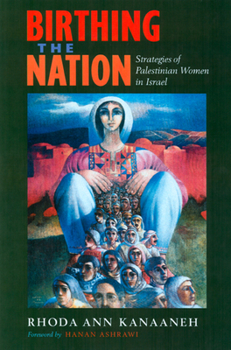Birthing the Nation: Strategies of Palestinian Women in Israel
Select Format
Select Condition 
Book Overview
In this rich, evocative study, Rhoda Ann Kanaaneh examines the changing notions of sexuality, family, and reproduction among Palestinians living in Israel. Distinguishing itself amid the media maelstrom that has homogenized Palestinians as "terrorists," this important new work offers a complex, nuanced, and humanized depiction of a group rendered invisible despite its substantial size, now accounting for nearly twenty percent of Israel's population...
Format:Paperback
Language:English
ISBN:0520229444
ISBN13:9780520229440
Release Date:June 2002
Publisher:University of California Press
Length:300 Pages
Weight:0.90 lbs.
Dimensions:0.7" x 6.0" x 8.9"
Customer Reviews
2 ratings
A biased text about an important issue
Published by Thriftbooks.com User , 20 years ago
A good book explaining the `feminist' approach to Israeli-Arabs living in the Gallillee. This book is not a feminist anthology on Palisitnians on the west bank, rather it is a feminist-nationalist book on the Arab women living in Israel. It looks partly at the ideas of modernization among arab/muslim women in Israel and tries to look at the varying way that women are used in the nationalist anti-Israel movement. One method is examining birth rates. In order to `modernize' the Arab women they are encouraged to marry older and have less children. But a second nationalist strain encourages them to have more children in order to `out breed' the Jewish population. It is an interesting study. A very biased book which frequently replaces the word `Jew' with the word `zionist' but it is also the only book of its kind on the issues confronting Arabs in Israel, especially women. Unfortunately there is little focus on the status of women in Arab society, rather the book looks at women as a tool to confronting Israel and how the Arab community uses women in this manner, thus it examines the status of women in Israeli society. But unfortunately although this is supposed to be a feminist text, it comes off as very nationalist, not analyzing problems associated with women in muslim communities, particularly the phenomenon of `Honor Killings' and other issues, such as the education of women are availability of abortions. An interesting book, a good contribution to literature on Israel, but one must read it with a questioning eye. Seth J. Frantzman
a gem -- funny, absorbing and important
Published by Thriftbooks.com User , 22 years ago
Birthing the Nation is a remarkable work of anthropology as well as an important political document. It is one of those books that, by taking a narrow topic and exploring it thoroughly, offers stunning insights on everything from the Palestinian-Israeli conflict to the nature of modernity itself. It also is a fun read, filled with hilarious anecdotes and fascinating details. (It is, after all, about sex.)The author is both an American and Israeli citizen who grew up in a Palestinian village in Israel. She speaks fluent Arabic, Hebrew, and English and did her advanced schooling in the U.S. This special background makes her uniquely qualified to explore such a topic. Because she was raised in a Palestinian village, people from that area were willing to talk to her freely about their private lives. Because she is American-educated and has lived in the United States (and is married to a Jewish American), she knows how to describe Arab culture to Western readers. She knows what we will be interested in, and knows what needs explaining. Kanaaneh devotes a decent amount of time to Israeli government policies regarding reproduction and Israeli political rhetoric on these issues. But the heart of her book is her fieldwork -- hundreds of hours of interviews with Palestinians about having children and having sex, and how the people themselves take stock of such things.The book's main contention is that in Palestinian communities in Israel, reproductive decisions are used as a way of measuring modernity. For example, for many Palestinians, a family's decision to have few children is seen as an indication of how advanced they are. For others, having many children is seen as an indication of how dedicated they are to their national cause. Either way, reproductive decisions are interpreted in a highly politicized manner (by the people involved in them, not by Kanaaneh). The same is true for birth control methods and sex education programs. The book is chock full of surprising details. Kanaaneh presents a picture of a vibrant, changing society that is not quite so "backward" as some of us like to believe. One detail that surprised me particularly was that in Palestinian sex education classes, masturbation is taught as a safe alternative to sex. When a U.S. Surgeon General suggested such a thing during the Clinton administration, the American political establishment went into a delirium (both Democrats and Republicans) and she was quickly stripped of her position! Another thing that is evident is that sensual pleasures -- for both women and men -- have always been an important part of Arab culture, and in some ways the Palestinians are more open about these things than we have been.As a way of "getting into" another culture, this book can't be beat. And given the rapidly changing nature of Palestinian society (and its sadly uncertain future), one feels as though one is reading a historical document in the making. This is a real find.






